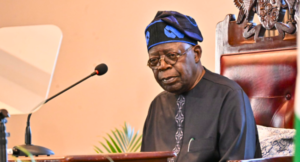*Foreign Reserve Grew by Almost $3bn in five weeks

Between July 1 and August 7, 2025, Nigeria’s foreign reserves surged from $37.195 billion to $40.159 billion—a remarkable $3 billion accretion in just five weeks. This is not a statistical fluke. It is the fruit of deliberate reforms, fiscal discipline, and a renewed national ethos.
If sustained, this trajectory could translate into a $30 billion boost to Nigeria’s reserves over the next year—a transformation that would strengthen Nigeria’s position as a continental anchor of financial stability. (This projection assumes continued reform momentum, stable oil receipts, and improved investor inflows. It is aspirational, not guaranteed—but grounded in recent trends.)
Why Foreign Reserves Matter
A robust foreign reserve is not just a number—it is a sovereign shield. It empowers a nation to:
– Stabilize its currency: By defending the naira against speculative attacks and market volatility.
– Meet external obligations: Including debt repayments and import bills, without resorting to emergency borrowing.
– Inspire investor confidence: Signaling macroeconomic resilience and creditworthiness.
Indeed, Nigeria’s recent reserve rebound has already helped restore investor trust, narrow exchange rate gaps, and support the naira’s relative stability.
Global Applause, Local Responsibility
The world is watching—and applauding. From the World Bank to the IMF, and notably the WTO led by our own Dr. Ngozi Okonjo-Iweala, Nigeria’s reforms are being hailed as courageous and stabilizing. But as Okonjo-Iweala rightly cautions, stability is only the foundation. The next imperative is growth with compassion.
“We need to put in social safety nets so that people who are feeling the pinch of the reforms can also have some support to weather the hardship.” — Ngozi Okonjo-Iweala.
Nigeria stands at a rare inflection point. The storm is over, but the journey has just begun.
The Moral Mandate: Social Safety Nets
The Tinubu government has already initiated several commendable interventions—from conditional cash transfers and agricultural support schemes to the Women Exporters Fund launched in partnership with the WTO and ITC. These efforts reflect a growing commitment to inclusive growth.
READ ALSO: By-election: 100 suspected political thugs arrested in Kano
However, the scale and urgency of hardship demand more. The government must now expand and deepen these safety nets to reach millions more—especially those disproportionately affected by subsidy removals, inflation, and structural reforms.
Social protection is not charity. It is economic strategy. It cushions reform shocks, preserves dignity, and builds resilience.
Sports: The Sleeping Giant of Economic Revival
One such intervention lies in strategic investment in sports—a sector brimming with untapped potential. Nigeria’s youth are vibrant, talented, and hungry for opportunity. Sports can absorb millions into productive engagement, catalyze economic growth, and restore national pride.
Consider the facts:
– Nigeria missed the last FIFA World Cup, and faces a herculean task in qualifying for the next one.
– Our team was recently humiliated in CHAN with a 4–0 loss to Sudan.
– Our stadiums—from Surulere to Abuja—are relics of neglect.
This is not just sporting failure. It is a symbolic erosion of national vitality.
A Blueprint for Sporting Renaissance
In the first phase, the government could select eight stadiums for complete modernization—one in each of the six geopolitical zones, and one each in Lagos and Abuja—under the Renewed Hope Infrastructure Fund. This will:
– Create jobs in construction, maintenance, and event management.
– Stimulate tourism, hospitality, and fashion through regular sporting events.
– Improve athlete performance, boosting Nigeria’s global image.
– Foster unity and youth engagement, reducing crime and despair.
Global Precedents: Sports as Economic Catalyst
Countries like Qatar and Brazil have shown how strategic investment in sports can transform national fortunes. Qatar’s $220 billion investment ahead of the 2022 World Cup turned the nation into a global tourism hub. Brazil’s hosting of the World Cup and Olympics catalyzed urban renewal and job creation. These were not mere spectacles—they were economic engines.
UNESCO estimates that every $1 invested in sports can yield up to $124 in social and economic value. For Nigeria, this is not just a game—it is a game changer.
Conclusion: From Stability to Scale
Nigeria stands at a rare inflection point. The storm is over, but the journey has just begun. With rising reserves, global endorsement, and a reformist government, we have the tools. What we need now is scale—to translate macroeconomic gains into human dignity, youth empowerment, and national pride.
Let us invest more in our people.
Let us modernize our stadiums.
Let us accelerate social safety nets.
Let us make Nigeria not just stable—but stunning.














